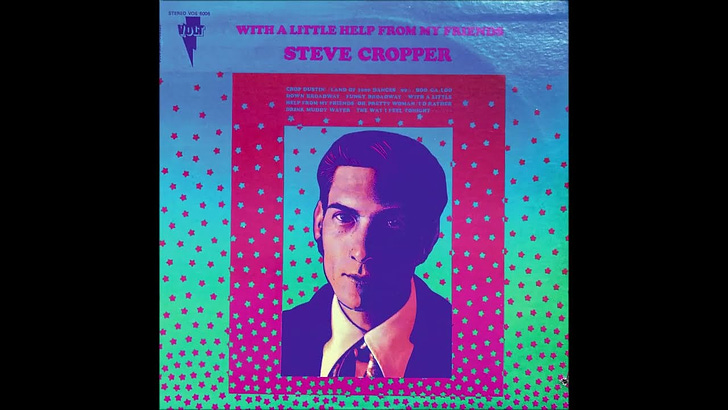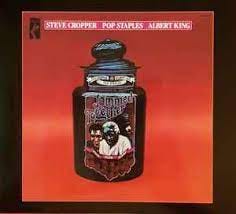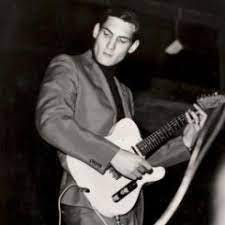Steve Cropper: Trailblazer/Digital Phantom
Another in our continuing "Laments Over the Absence of Credits" series...
For a guy whose work mostly appears on other people’s records, Steve Cropper is surprisingly findable on the music services of the Interweb.
The guitarist, songwriter and producer contributed in multiple ways to the mid ‘60s success of Memphis-based Stax/Volt Records. As part of Booker T. and the MG’s, the house rhythm section, he helped create the label’s elemental, high-tension grooves. As a songwriter, he wrote or cowrote classics – among them Wilson Pickett’s “In the Midnight Hour,” Carla Thomas’ “Comfort Me,” Otis Redding’s “Just One More Day” and “(Sitting On) The Dock of the Bay” – all built on Stax’ crisp, no-nonsense rhythmic signature. His resume as a producer includes the tremendous Johnny Taylor album Raw Blues and Jose Feliciano’s Compartments and some equally surprising titles.
This week, Cropper’s debut solo effort, With a Little Help From My Friends, got the reissue treatment (and, presumably, an algorithmic “new release” bump in the streaming sweepstakes). It came out in 1969, and was recorded in close proximity to another (mostly) instrumental gem from Stax: The hotwired Jammed Together, a guitar three-way with Cropper, Pops Staples and Albert King showing just how much distinctively personal shading and nuance and feeling can be wrung from the electric guitar.
With a Little Help is certainly “of” its moment – it’s got stretchy guitar textures that evoke the journeying blues-rock ethos of 1969, and it moves with an assured, revue-band-in-live-performance swagger. But in one way it was decades ahead of its time: No credits!
As Memphis music expert Robert Gordon writes in the liner notes accompanying the reissue, “There’s no personnel listed on the album, and to this day that rankles Steve a bit.” This omission, the notes explain, was because of the album’s rushed inclusion in a label marketing push called Soul Explosion, and also is attributable to the way things generally worked at Stax: Cropper would test out original tunes (like the opener “Crop Dustin’,” which he cowrote with Buddy Miles) on sessions for William Bell or other artists backed by the MGs. The guitarist recorded instrumentals regularly, putting partially finished tracks on the shelf to revisit later. Further complicating things, some of With a Little Help was captured at Leon Russell’s house in Los Angeles. Documenting personnel information was evidently not a top priority there.
The omission of who did what on a title from 1969 probably won’t seem like much of a thing to those who use Spotify or other streaming services to discover music. After all, virtually every title in streaming land is like that now, reducing musicians and other creatives to anonymous cogs in a gargantuan machine. One that relies on them yet doesn’t care to know or share their names.
But to a musician like Cropper – who appeared on hundreds of Stax singles and albums, and then after leaving the label did session work for rock stars (he’s on John Lennon’s Rock & Roll) and blues legends – credits are like oxygen. Vital for continued life. Essential to an individual’s participation in the ecosystem, and to that ecosystem’s continued development.
The credits, which can – but often don’t – travel along with the audio files as metadata provided by the issuing labels, are equally vital to listeners. They activate curiosity. They can be clues to the endless spiderwebbed history of scenes and sounds, directional indicators for where to explore next. They help us to understand the artist’s evolution from project to project and decade to decade. Spotify (which made a big deal of adding some songwriter and producer credits in 2018) and the other services obviously know this (see: playlists).
Of course adding metadata to existing items in a database costs money. These services can blame others in the chain, so of course they do.
Sigh.
That’s a shorted-out circuit right there, one that is entirely justifiable if you’re keeping score by the bottom line but makes no sense if you are concerned about cultivating the art and sustaining its creators over the longer term. It’s daunting to think about how guitar connoisseurs of 2023 might hope to discover the blistering rhythm section workouts of With a Little Help. Certainly the Beatles cover and the other covers are one path to lure the curious; the fact that it’s on Stax might help, too. There are plenty of breadcrumbs to follow once you know where to look.
But that’s the trick: Starting cold and relying on the information in the (not always hyperlinked) streaming databases, you might not ever find your way to Steve Cropper. That would be a shame, because his playing here is a deep clinic on the fine points of lead and rhythm guitar: On track after track, he illustrates how to use slight inflections, how to build intensity with exacting, stinging and endlessly varied articulation, and how to transform shopworn blues phrases through carefully calibrated pitch bends.
Is With a Little Help the best introduction to Cropper and the incredibly gifted musicians that were part of his working crew? Maybe not. But it’s a solid example of why he’s important to music, and why each of his recorded contributions should be easily searchable and findable. Here’s a creator/co-creator of an approach to guitar and rhythm-section playing whose ideas spread like (analog) wildfire through subsequent generations and helped expand the lexicon of groove. For all his credits, he and many (most?) others in the session-musician community contend with a perverse and pervasive modern form of erasure: They’re trailblazers and digital phantoms at the same time.







